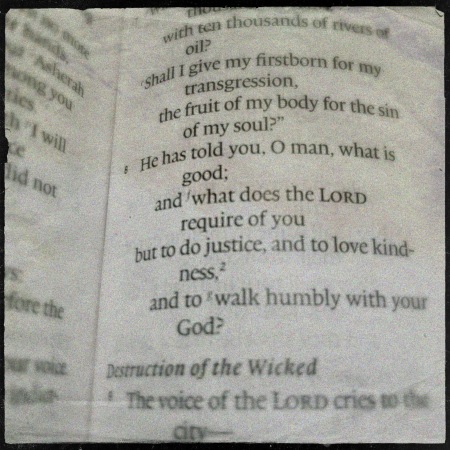Biblical Anthropology: Everything Together (4)
For me, the next two studies that we did in our Biblical Anthropology series were the most challenging – Justice and Partiality. I have no idea how many articles and books I read while I was studying for this topic, which of course also touches on the issue of racism.

I think that one of the reasons why these topics were so challenging was that we do always see truth mixed with lies in our world. Sometimes we think that when someone is talking about love, or justice, or equality, that they’re talking about the same things that we’re talking about. But so often the world changes definitions, or else smuggles in something else with the truth.
As Christians, we know that God is just, and that justice comes from God and His Bible. For example, we protect the innocent before the law, even though this means that some people will temporarily escape justice. Temporarily, because we know that someday God will bring perfect justice to all. There is a final judgement.
We briefly introduced a few terms that have become important in our world, such as Marxism, or neo-Marxism, from the antichristian philosophies of Karl Marx.
“Marxism” doesn’t explain all the philosophy of the modern world, but we only had time to quickly look at some key points.
For example, in Marxism, you’re not judged by your character in the end, but more by the group which you belong to – as oppressed or oppressor.
And I should probably clarify something. If someone today says that a white man is racist, they’re probably not using a stereotype or a generalization. Under this philosophy, the individual white man is not considered racist because all white men tend to be racist, but because he belongs to the group, in this case a group defined by skin colour. Do you understand the difference?
Neo-Marxism is a revolutionary system. Everything must be burned down and rebuilt. Reboot, restart, rebuild better. So if you sometimes wonder why many people in power seem to be doing things that destroy more than build, often this is the reason.
But in biblical justice, we should be punished for our own sin. And there’s a lot of teaching in Ezekiel 18 about this. We are judged for our own character and actions. In God’s law, and so in the human court, we are innocent until proven guilty. And the source of your value is not the group you belong to, but the imago dei. And salvation is in Christ, not in activism.
We are all descendants of Adam, and so we don’t judge people (before the law) based on DNA, or skin colour, or whatever it may be. We judge, in a limited sense, in the way God judges – the fruit tells you what kind of a tree you have. We don’t judge in a different way because someone is rich or poor, because he has power, or has no home.
Another key point here is the unity of the local church. This from Colossians 3:11 – “Here there is not Greek and Jew, circumcised and uncircumcised, barbarian, Scythian, slave, free…” – and we could properly add, there is no man, woman, child, adult, Mexican, Canadian, rich, poor, whatever – “but Christ is all, and in all.” One Church.
Talking about justice in general, we believe that, in a sense, the law is king. The Latin term is lex rex. The prime minister, the scientist, the rich person, all are subject to the law. And the law must come ultimately from God’s Word. And so we could also say – veritas rex – truth is king. The truth, not the person in power, or the person with the scholarly title.
The famous Mexican revolutionary said, “I want to die being a slave to principles, not men.” Well, if those principles come from the Bible, from God’s Word, principles of justice, love, and compassion – then I would agree!
Truth is very important to the Christian. Honesty. Science. Logic. But the world rejects God’s truth to a large degree, and invents new “truths”, other “ways of knowing”. Standpoint epistemology.
The Christian accepts personal responsibility, and practises generosity and love. Many in the world today seem to want to give the government more and more control, so that they can be a saviour and a god. But where there is no absolute truth, when the law of God is rejected and limits are rejected, the lie with the most power behind it wins.
It is not the government that gives us truth, although it should defend the truth. The government does not give us rights, but it should defend the rights that are given to us by God.
That’s a lot to chew on for today. And I realize that some of these things have become even more a topic of discussion since we first did our study in Mexico. We need to keep thinking about these things and discussing them, with God’s Word as our foundation.
… to be continued!
